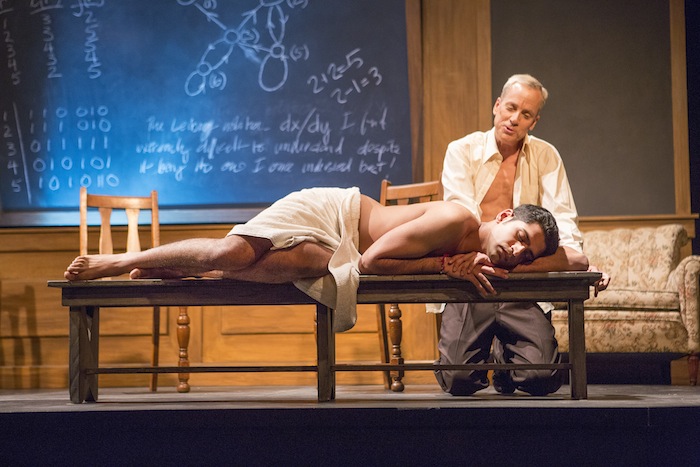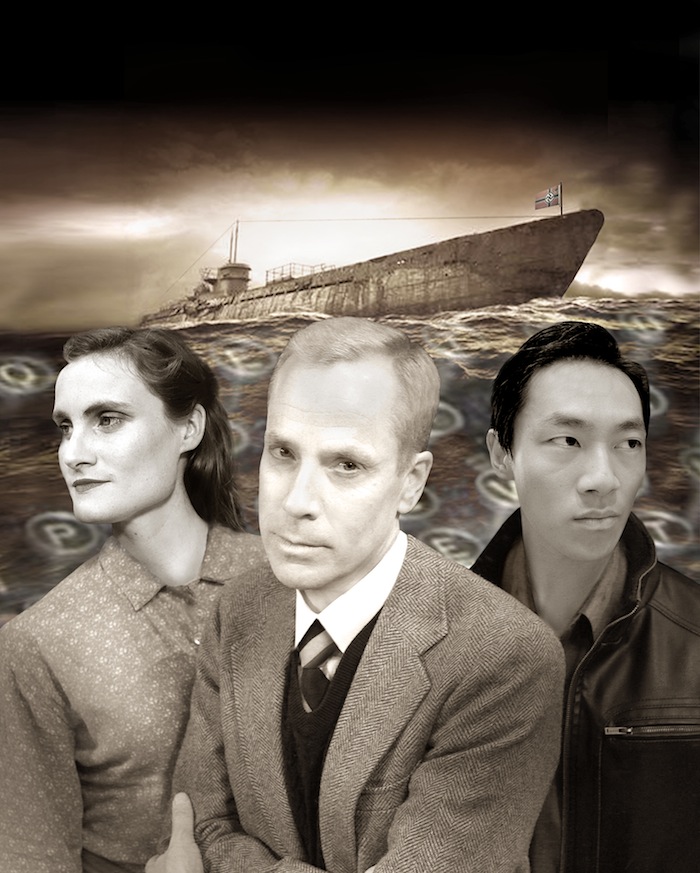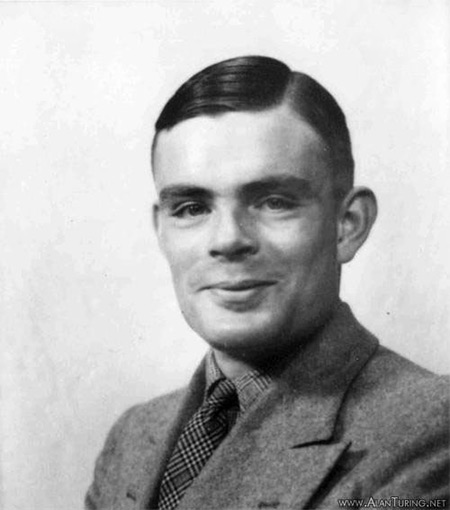Theatre Rhinoceros takes on the tragic, complicated story of the gay mathematician who helped save the world.

By Marke B.
ONSTAGE Things get cooking in the second act of “Breaking the Code: The Alan Turing Story” (through Aug 29 at Eureka Theater), the Theatre Rhinoceros production of Hugh Whitmore’s 1986 play about the enigmatic English mathematician and early computer scientist, directed by John Fisher, who also stars in the Turing role.
So if the perfectly pleasant, slow-burn Masterpiece Theatre-like vibe of the first act (what the nice lady sitting next to me, who was from the UK and therefore an expert at such things, called “the British way of building character”) doesn’t rivet you, stick around. Like math itself, it draws you in as it burrows deeper, touching, at least lightly, on philosophy, impossible relationships, and the nature of identity itself.
That sounds like heady stuff, and to be honest, going into “Breaking the Code” — a biographical treatment of the gay cryptologist and visionary who helped win World War II, but wasn’t closeted enough to escape persecution by his former employer, the British government — I dreaded another high-pitched, talky disaster along the lines of the incomprehensible Copenhagen, another play about famous number-junkies involved in WWII, presented at ACT in 2001.
Fear not, though — Fisher and Co. deftly mix the mathematics and personal dramatics of Turing’s life in a way that didn’t make my pretty head spin. There are even a few good laugh lines, here, although the players don’t hit them any harder than needed. And if, in the end, some of the metaphors and lines of inquiry don’t quite hang together, this solid, entertaining effort raises some important questions, in a “Brideshead Revisited” atmosphere.
Dramatizing Turing, an alluring yet prickly figure whose life had both too much plot and not enough of it, is a challenge. He was involved in big things — his invaluable work breaking the Nazi’s Enigma Code at Britain’s famous intelligence site Bletchley Park shortened the war by up to two years, and his Turing Machine proposition laid the foundations for the modern computer — but whether those things can be strung along a timeline to form a cohesive drama is another question. Socially awkward but sexually forward, a self-aware genius who fatally miscalculated his position in the social order, too clever by half yet too daft about life, Turing’s personality was the definition of opaque.
The gay rights movement has tried mightily for years to fit his slippery story into a tidy narrative of sexual oppression. (Spoiler alert: He killed himself, probably.) There’s even an of-the-moment transgender twist, as Turing was sentenced under homosexual criminal codes to take estrogen for “chemical castration” and soon grew breasts. But over the course of several books, two mainstream movies (“Breaking the Code” is much more sexually frank than last year’s The Imitation Game), a song cycle, an experimental album, and even an opera, Turing’s inner life remains as inscrutable as the half-erased equations on the blackboards of this production’s lovely set.
Help us save local journalism!
Every tax-deductible donation helps us grow to cover the issues that mean the most to our community. Become a 48 Hills Hero and support the only daily progressive news source in the Bay Area.
Better maybe just to leap into his story and simply tell what happened, with the touch of melodrama to be expected from the writer of 84 Charing Cross Road and other 1980s Anglophile movies, which “Breaking the Code” does very well.

The thrillingly game cast — PBS needs to snap these folks up — chomps into the somewhat-overripe plum roles, which on paper tick off most British stereotypes: chirpy, oblivious Mum forever coming in from the garden (Celia Maurice); blustery, mustachioed detective hot on the trail (Patrick Ross); tut-tut-cheerio absent-minded mentor with eccentric spectacles (Val Hendrickson); doomed Indian schoolboy chum (Heren Patel); chiseled and sticky-fingered rough trade (Ron Miller), mysterious man in overcoat (Kevin Copps). It’s like Agatha Christie, but gay and geeky.
A more sophisticated character is that of Turing’s lab partner and romantic foil Pat Green, played by the wonderful Gloria McDonald, who surely deserves an award for clearly and enchantingly reciting the complex inner workings of Enigma-decipherment while stalking the stage in heels, and later retaining a stiff upper lip while something as basic as the Fibonacci sequence is mansplained to her. She turns out to be breathtakingly open-minded for the times in terms of sexuality and its distinction from marriage. (“Pat Green” is actually a fictionalization of the real-life Joan Clarke, whose position as the only female member of the code-cracking team probably deserves its own play.)
Then there’s the wiry, energetic Fischer as Turing himself, taking on the huge task of bringing the dude to life, from fidgety, lovestruck schoolboy days, through Bletchley Park triumph, to sad, lonely end. As the narrative jumps around in time, some of the telegraphing grows a bit broad (chewing fingers means we’re in the presence of young Turing, sweater vests signal middle age), but Fisher takes a jumble of attributes — including a stammer — and assembles a credible, complex character who grows on us. You either want to slap him or cheer his blind courage when he casually reveals too much about his love life to the cops, which is a good sign he’s won us over. Good show.

CODA And now, here’s what I think of the play as a middle-aged gay man. “Breaking the Code” is from 1986, and that was a time when a play speaking the truth about the tragic costs of repressing homosexuals was a brave, even breathtaking thing. (Britain passed the odiously anti-gay Section 25 that very year.) There was much at stake in telling the story of how one of Britain’s heroes — a member of the Order of the British Empire, no less — was destroyed by the very country he saved, merely for being attracted to men.
Homophobia is still a real problem, but in the joyous wake of the Supreme Court’s same-sex marriage decision, it was a strange experience seeing a play that rehearses a narrative that has for so long been ingrained in every gay person’s history. We actually might be able to have traditional happy endings now, unlike Turing, or Wilde, or thousands upon thousands of others whose sad stories have been drilled into our heads. Oppression among well-to-do aesthetes and brainiacs seems so old-fashioned right now. What keeps the play contemporary is Turing’s self-incriminating forthrightness about his sexuality — he loved sex — and the Pat Green character’s acceptance and romantic flexibility.
But — alongside its appeal to gay tech geeks attracted by Turing’s mythos — putting on this play now is a valuable action, I think, even if we currently might feel “over” such things. (Remember when the HIV drug cocktail came along? No one wanted to talk about the AIDS years for quite a while. Then of course, they came roaring back in a powerful form of nostalgia.) If we don’t preserve these stories, no matter how painful or against the contemporary tide, they might be buried in a wave of false self-confidence and eagerness to move on from the past — when really tales like Turing’s are the basis for everything we’ve struggled to achieve.
“BREAKING THE CODE: THE ALAN TURING STORY”
A Theatre Rhinoceros Production
Through Aug. 29
Wed-Sat, 8pm plus 3pm Saturday matinee, $15-$20
Eureka Theater, SF
Tickets and more info here.



